Report: The BEARR Trust Annual Conference – November 29, 2024
Report by BEARR Trustee Sam Thorne – December 9, 2024
Civil Society Innovation in Health and Social Welfare at Times of Crisis in The BEARR Trust Region
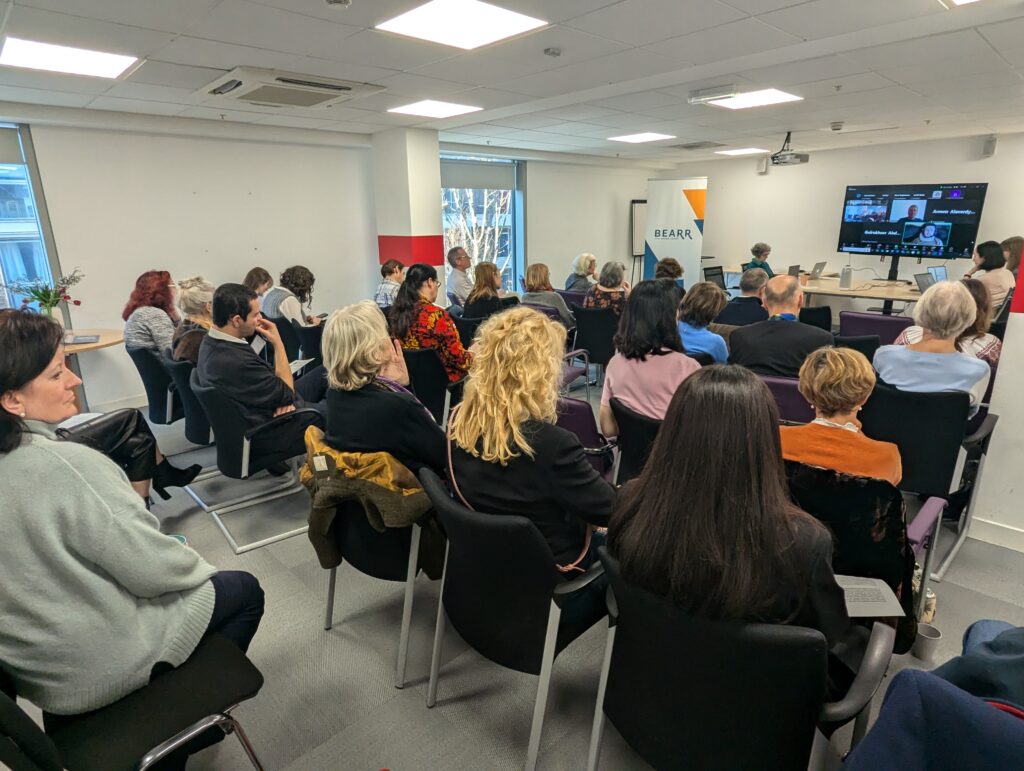
The 2024 BEARR Trust Annual Conference focused on how civil society organisations have responded in creative ways to multiple crises over the past few years, including the Covid pandemic, war and political upheavals. Discussions highlighted a range of innovative work being done by small, local organisations to address the diverse needs of vulnerable groups, including people with disabilities, victims of domestic violence and people displaced by the war in Ukraine and the Nagorno-Karabakh conflict.
Panellists from Armenia, Kyrgyzstan, Tajikistan and Ukraine discussed a number of community-based projects, many enabled by funding from BEARR, including:
- Advice and support services to victims of domestic violence in Tajikistan
- Improvements to accessibility and the provision of information to people with disabilities in Armenia
- Humanitarian and psychological support for internally displaced people and people living in frontline areas in Ukraine
- Partnership work with state agencies to deliver services to children in orphanages and migrants in Kyrgyzstan
- Initiatives to build capacity, strengthen organisational resilience and provide support to volunteers in Ukraine.
The conference was a hybrid event, for the third year running. Around thirty people joined online, in the UK and in the countries where BEARR works in Eastern Europe and Central Asia, and more than thirty people attended in person at Voluntary Action Islington in London. It was also again a trilingual conference, conducted simultaneously in English, Russian and Ukrainian.
The conference consisted of two panel discussions, followed by a plenary discussion. Attendees were welcomed by Nicola Ramsden, outgoing Chair of The BEARR Trust, who noted that CSOs had faced so many crises in the past few years, it may be more accurate to use the term ‘polycrisis’ to describe the challenges they have faced.
Nicola also highlighted that five conference speakers had received grants from BEARR in the past, highlighting the value of BEARR’s approach to partnering with local CSOs, who can make a huge difference with relatively limited resources. Donations can be made to BEARR and our partner organisations via our Donate page here. All the panellists were extremely grateful for the funding and moral support provided by donors, and for the opportunities that BEARR has provided them to network and share practice.
The BEARR Trustees would like to thank the panellists, panel chairs and attendees for their participation in the conference, along with our interpreters, Alexander Stetsenko and Lisa Snegireva, and translator Oksana Yurchenko. Particular thanks to BEARR Trustee Marcia Levy and to BEARR Information and Administration Officer Valdone Sniukaite for their great work in organising the conference.
Further detail is provided below on the panel discussions, plenary session and closing remarks by Ross Gill, the incoming Chair of The BEARR Trust.
Panel 1 discussion
The first panel discussion was moderated by BEARR Trustee Michael Rasell, with three panellists:
- Gulrukhsor Abdullaeva, Executive Director, Women’s Centre “Gulrukhsor”, Khujand, Tajikistan
- Armen Alaverdyan, Executive Director, Unison, Yerevan, Armenia
- Ivan Vostroknutov, Head, Kharkiv City Boxing Club, Kharkiv, Ukraine.
The discussion topic was “Innovation in working with people facing vulnerability and marginalisation”, with panellists describing their work with victims of domestic violence in Tajikistan, people with disabilities in Armenia and internally displaced people and people living in frontline areas in Ukraine.
Gulrukhsor, speaking online from Tajikistan, gave an overview of the work of the “Gulrukhsor” Women’s Centre, which was established in 1996 and has since provided a confidential helpline, shelters and other resources for women suffering from domestic violence. The centre has provided services around the clock, without closing, for over 28 years. Gulrukhsor explained the extent of challenges facing them. Official statistics say that 30% of women in Tajikistan are affected by domestic violence, although the true figures are thought to be much higher. There are strong social, cultural and economic forces that prevent women from reporting domestic violence or leaving violent partners.
The centre was at the forefront of a campaign to introduce a new law against domestic violence in 2013, but this law has not been enough to address the deep structural issues that perpetuate domestic violence. Women are reluctant to seek prosecutions of domestic violence, with surveys suggesting that over 70% of women feel they have to put up with violence to preserve their families. The centre is working on various long-term projects to improve and expand services for Tajik women. Services for victims of domestic violence are few and far between in Tajikistan, with only four shelters in the whole country, for a population of more than ten million. Evidence suggests that if domestic abusers know that women have recourse to help and services, violence will go down.
Gulrukhsor said the centre was looking to innovate in two main areas. One area was to expand opportunities for women to be economically independent from their partners or families. The centre provided guidance for women about online business accelerators, Islamic banking and other opportunities. The second area was to coach women to advocate for change in their own families and to use peer support groups to increase women’s strength and confidence to defend their rights.
Armen, joining from Armenia, summarised the purposes and main achievements of Unison, since it was established two years ago. Unison is a non-profit organisation whose mission is to support people with disabilities by promoting their human rights, improving accessibility to facilities and services, and providing various forms of support. Although Armenia has passed accessibility legislation and signed up to agreements such as the Convention on the Rights of Persons with Disabilities (CRPD), there is often a gap, said Armen, between what was agreed on paper and what was implemented in reality.
Unison’s major achievements have included placing over 660 people with disabilities into jobs and negotiating a major transportation reform in Yerevan, whereby all new buses and trolleybuses will be 100% accessible from now on. “I don’t know any percent except for 100 percent,” was Armen’s response to lesser solutions put forward by others. Unison has used various innovative methods to publicise such campaigns and achieve their goals, including flash mobs and an annual beauty contest for women with disabilities.
Armen described Unison’s innovative responses to the Covid pandemic and the Nagorno-Karabakh crises. During Covid, Unison distributed face masks and other humanitarian aid, but their main contribution was to provide information to people with disabilities, such as how to make wheelchairs safe and how to mitigate communication problems for people with hearing issues when everyone was wearing masks. Unison also managed to rehearse and deliver a Chamber Choir concert, despite the conductor being in America and all the choristers joining online: a way to “show people that life continues”, Armen said.
More recently, Unison has provided support to around 9000 displaced people with disabilities, out of about 100,000 people in total who have been displaced from Nagorno-Karabakh since the conflict erupted for a second time in September 2023. As with the Covid crisis, Unison has stepped into the breach where the government has been unable to respond, distributing wheelchairs and other assistive devices, and most importantly, providing essential information to people, such as how to apply for disability status and access services.
Ivan, in Kharkiv, Ukraine, also talked about the challenges of supporting internally displaced people, as well as people who continue to live in frontline areas, where they are exposed to shelling and other military threats, and a lack of food and basic amenities.
Ivan highlighted food, hygiene, psychological support, building repairs and medical care as the key basic needs of people in frontline areas. Kharkiv City Boxing Club has collaborated with other local organisations and local authorities to deliver aid to these areas, which are dangerous and hard to reach. He emphasised the importance of coordination between agencies to avoid duplication and make the most of limited resources.
He described the similarities and differences in approach needed to support internally displaced people (IDPs) who had moved away from frontline areas. For example, whereas food boxes were the best solution for people in frontline areas, food vouchers worked better for IDPs.
Ivan said that Kharkiv City Boxing Club was already thinking about longer-term projects and the challenge of how to rebuild society after the war, but the priority remained to support people in the here and now. He concluded: “We can help the vulnerable people to survive and then we can heal the society”.
A Q&A session followed in which the panellists discussed ways in which they involved beneficiaries in the design and delivery of projects, and how they engaged with good practice from international organisations. Unison’s work with the European Network of Independent Living was one example. Vicky Fletcher from the Women’s Centre “Gulrukhsor” talked about the importance of learning from international research, such as Jane Monckton Smith’s research into causes of violence against women, and scientific approaches to developing solutions – while also ensuring that such approaches are adapted by local organisations to meet their own needs and contexts.
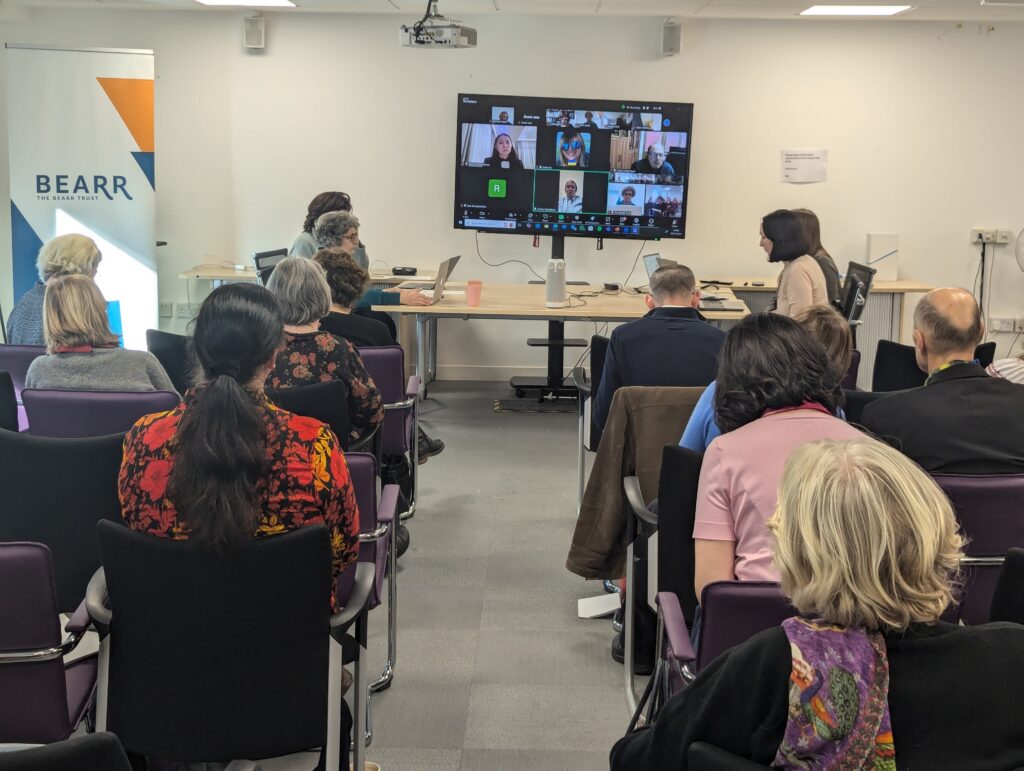
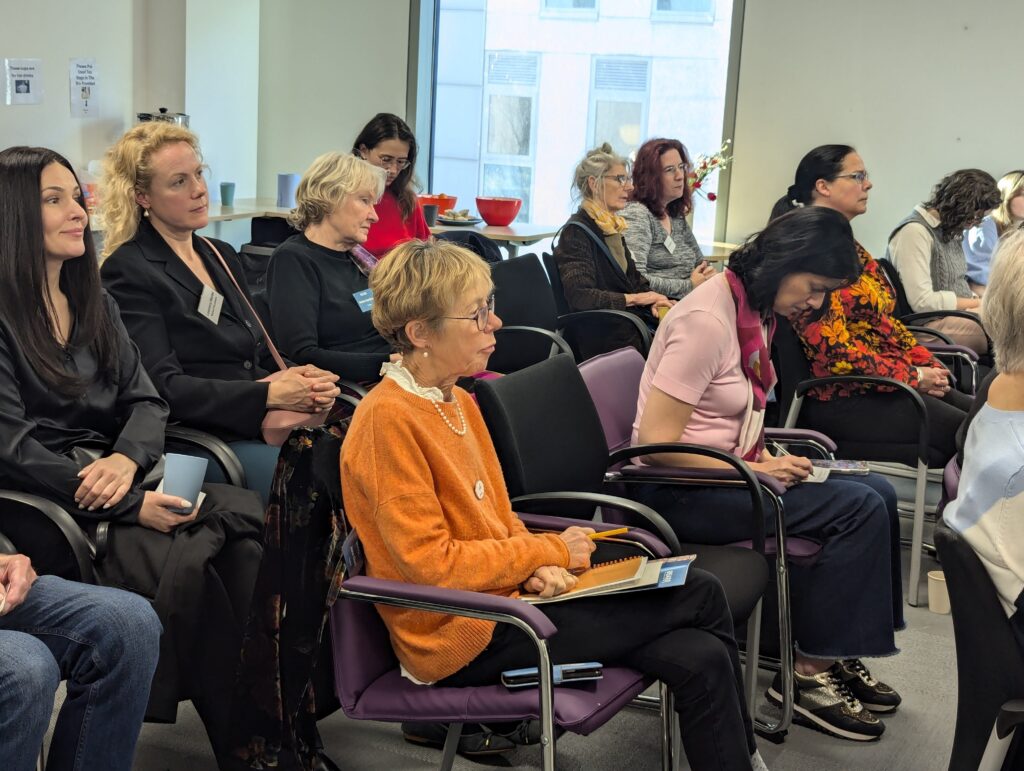
Panel 2 discussion
The second panel discussion was moderated by BEARR Trustee Clare Brooks, with three panellists:
- Daria Rybalchenko, Chairman of the Board at the National Network of Local Philanthropy Development, Kyiv, Ukraine
- Iryna Los, Head of Department, Open Doors, Nikopol, Ukraine
- Meerim Osmonalieva, Country Director, Oasis, Bishkek, Kyrgyzstan.
The discussion topic was “Innovative strategies to maximise civil society impact”, with panellists talking about the work they were doing to promote localisation and capacity building and to maintain organisational resilience in Ukraine, and to develop new approaches to working with state agencies in Kyrgyzstan.
Daria, speaking online from Ukraine, gave an overview of her organisation the National Network of Local Philanthropy Development (NNLPD) and their mission to develop social capital and a culture of philanthropy for the sustainable development of communities in Ukraine. NNLPD are part of a global network of Community Foundations, with over 2240 community foundations across 84 countries, and 15 in Ukraine.
Daria highlighted the value of her organisation and of community foundations to act as intermediaries between large international NGOs and small, local organisations – linking the physical and financial capital of international organisations with the human capital of local CSOs, who can deliver work on the ground. She talked about some of the challenges of working with large NGOs, who often lacked the agility or flexibility to respond quickly to local needs and crises. In 2022, NNLPD wrote an open letter to international donors and NGOs, titled “If not now, when?”, challenging them to cut bureaucracy and empower local organisations to determine their own approaches and priorities. Daria cited research suggesting that local organisations were about 15% more efficient in their use of resources than international organisations.
NNLPD continues to facilitate and advocate strongly for local CSOs, including through the creation of the Alliance of Ukrainian Civil Society Organisations and a second open letter to international NGOs, “Show your solidarity with Ukraine through action”, which can be accessed and signed via this link.
Iryna, also joining from Ukraine, discussed the challenges faced by her organisation Open Doors to maintain organisational resilience and look after the mental health of volunteers who were having to put their lives on the line every day to deliver support to vulnerable people in Nikopol, only a few kilometres from the frontline.
“We used to think Covid was a challenge but then war came,” Iryna said. She described the horrific conditions faced by people in Nikopol, under constant shelling and drone attack, with Russian troops hunting civilians individually with first person view (FPV) drones. By July 2024, 65 civilian residents had been killed, 84 wounded, 550 multi-storey buildings had been damaged or destroyed and the city had seen its water supply cut off after the Russians blew up the dam at Nova Kakhovka. About half of the population had left but half remained – and volunteers were continually on the verge of exhaustion and emotional burn-out from the volume of work to provide humanitarian assistance, legal and other forms of support.
Iryna talked about the importance therefore of a recent retreat for volunteers in the Carpathian Mountains: to rest, get assistance and support and look ahead – all in all, “to bring people back to life”. Looking after the physical and mental health of volunteers is critical, and it is an area where international support can make a difference: “together we are stronger”, Iryna concluded.
Meerim, speaking online from Kyrgyzstan, described how her organisation Oasis had responded to a 2023 change in the law governing international funding of local CSOs. As a result, Oasis had reassessed its approaches to working with ministries and other state agencies and formed collaborative partnerships to continue delivering support to vulnerable groups. Meerim said that state partners recognised Oasis’s local knowledge and expertise in supporting specific vulnerable groups, such as young people who have come out of orphanages, children in conflict with the law, migrants and refugees, some of whom were victims of trafficking.
Oasis had also taken steps to improve its financial sustainability, with Meerim highlighting their success in generating $12,000 through research and consulting services in 2024. Specific challenges include the current high volumes of migration from Kyrgyzstan, particularly into Russia, and an attack on international students in May that led to many students leaving. Oasis was seeking to help foreign migrants by establishing a referral mechanism for them to seek assistance in Kyrgyzstan. Meerim concluded that Oasis would continue to play its vital role in supporting vulnerable groups and in acting as the country’s leading specialists in providing support to orphanages and training for child psychologists.
In the following Q&A session, panellists discussed the practicalities and political nuances of working with state agencies, and the challenges of attracting and retaining volunteers in conditions such as those faced by Open Doors in Nikopol. The final question was whether the impacts of civil society were increasing or decreasing. Iryna said that since the full-scale invasion of Ukraine, the importance of civil society had become more obvious to everyone, including the government, which relied more and more on CSOs to engage with problems that state agencies could not resolve. Meerim also highlighted the positive effects of a vibrant civil society over the past twenty years in Kyrgyzstan and expressed the hope that partnerships with state agencies would continue to develop.
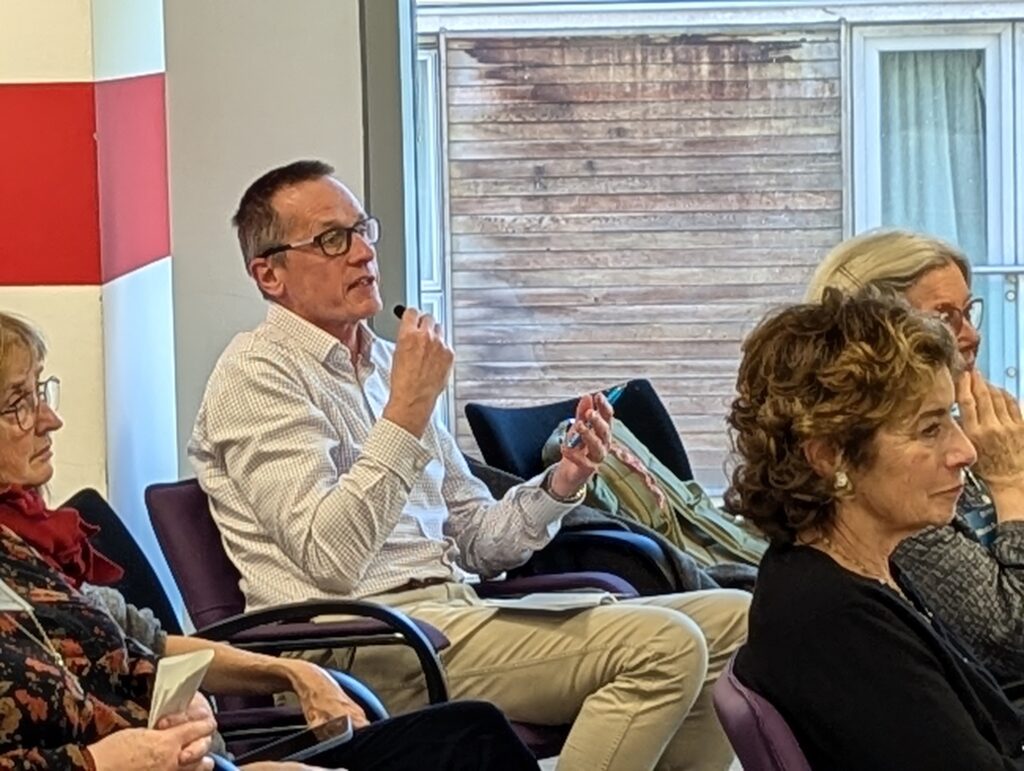
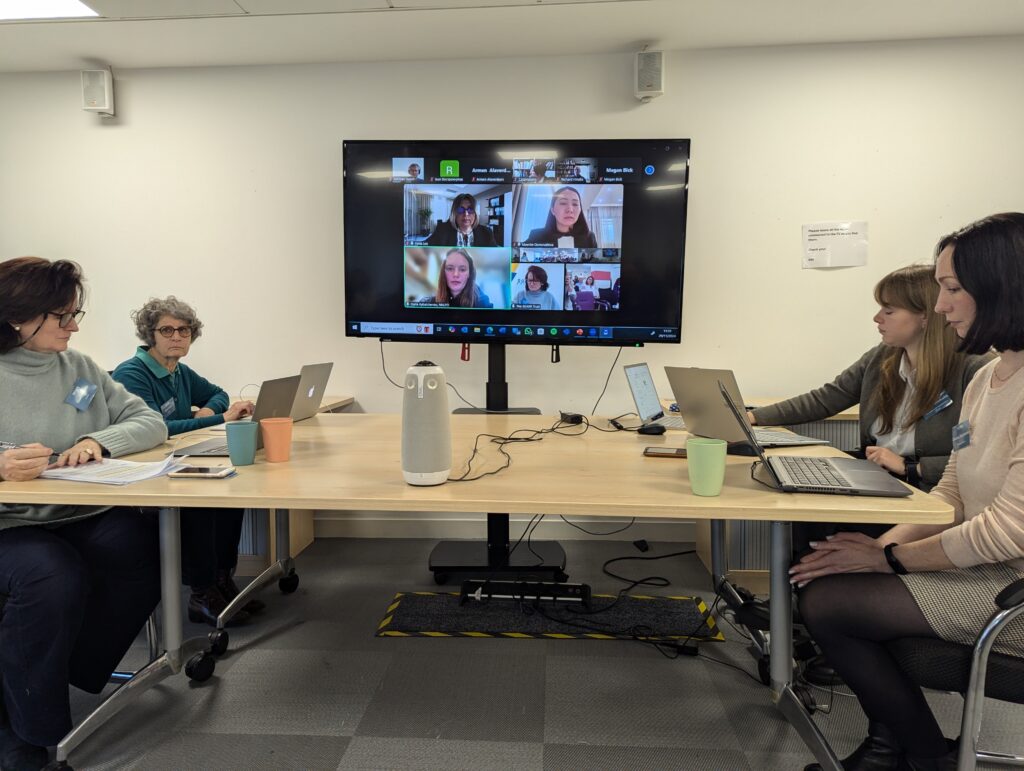
Plenary discussion
The two groups of panellists then reconvened for a plenary discussion, chaired by BEARR Trustee Janet Gunn.
Panellists explored further the challenges and opportunities of working with international donors and NGOs. The importance of mutual trust and flexibility were again emphasised. Meerim highlighted again the importance of allowing local organisations to design their own solutions to meet local needs and contexts, rather than imposing international solutions and standards. She compared this approach to forcing locals to wear a “deer hunter jacket” instead of a traditional Kyrgyz “chapan”.
Vicky from the Women’s Centre “Gulrukhsor” gave examples of good practice, where international organisations provided training on matters such as compliance, and poor practice, where local CSOs were provided with complex, untranslated documents and small-print clauses which can sometimes even lead to financial penalties that small charities do not have the funds to pay.
This led into a discussion about the challenges of covering operational costs and staff salaries, in a context of unstable funding cycles and grants that usually provided budget only to deliver projects but not to cover operational overheads.
Panellists also discussed the pros and cons of working with mass media and social media. Armen gave some illuminating examples of how mass media sometimes tried to cover disability issues and meant well, but undermined their efforts through mistakes such as using outdated or insensitive terminology, and biases, such as overlaying “sad” music over stories of people with disabilities, even when the stories were positive. Unison had recently counteracted this tendency with a humorous public service announcement, which had been a popular hit and led to many employers approaching them about providing opportunities to people with disabilities. Armen also noted the importance of using social media, with a Facebook post often leading to more of a response in government than a formal letter.
Other panellists also agreed that the media could be clumsy but that it was important to collaborate with them, as together they could have a greater impact in influencing public opinion and sometimes achieving material changes, such as amendments to legislation.
At the end of the discussion, Ross Gill, the incoming Chair of The BEARR Trust, thanked the panellists and conference organisers for their contributions. Ross echoed Nicola’s description of it being a time of ‘polycrisis’ – with CSOs having to respond both to sudden crises, such as Covid and war, and to ongoing crises such as the prevalence of domestic violence. He reflected that panellists had shown how crisis could be a driver of innovation – and an opportunity to demonstrate effectiveness and to build credit with beneficiaries and state agencies. He also reiterated the messages given about the need for trust, flexibility and local agency – values that were very much in line with BEARR’s approach of supporting and building relationships of trust with small, grassroots organisations. He concluded with an appeal to keep supporting BEARR and its partners, and to keep donating to the Ukraine Appeal, from which 100% of the funds go to local CSOs, working on the ground in Ukraine.